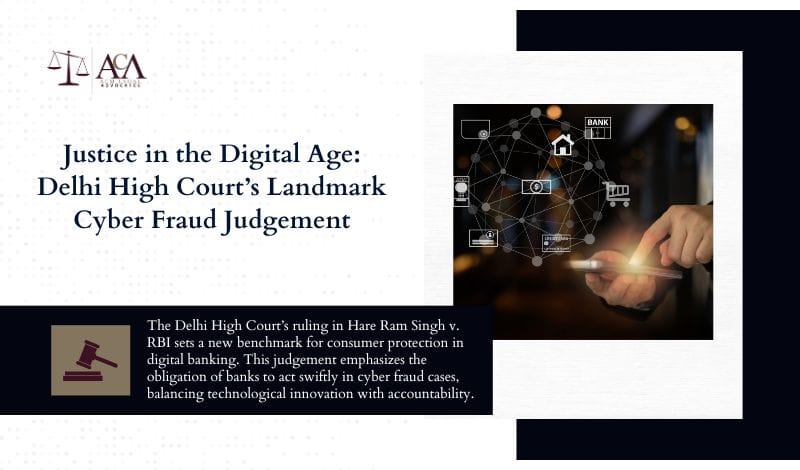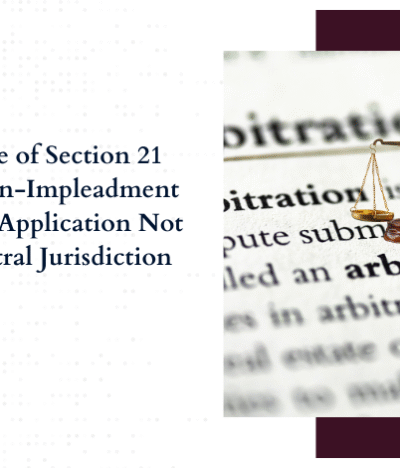The advent of digital banking which provides millions of users with unmatched speed and convenience has completely changed financial transactions. However, because this shift has exposed flaws in online systems cybercrime has become easier. In Hare Ram Singh v. Reserve Bank of India & Ors. (W.P.(C) 13497/2022), On November 18 2024 a landmark ruling by the Delhi High Court clarified financial institutions’ duties to protect customers and put strong digital security measures in place
Presided over by Justice Dharmesh Sharma, the court’s decision has set a new standard for addressing online fraud and banking negligence. The Judgement underscores the necessity of balancing technological innovation with accountability to ensure consumer protection in a rapidly evolving digital landscape.
The Case: A Harrowing Tale Of Cyber Fraud
A cyber fraud incident occurred on April 18 2021 involving the petitioner Mr. Hare Ram Singh a 55-year-old scholar. Targeting his State Bank of India (SBI) savings account resulted in ₹2. 6 lakhs in unapproved withdrawals. Even though he informed the bank of the fraudulent transactions right away nothing concrete was done to get his money back or stop more losses.
SBI’s lack of support for Mr.Singh regarding his claim raises significant concerns. The bank has asserted that the alleged fraud resulted from Mr. Singh’s negligence, claiming that the security measures on its internet banking platform—including One-Time Passwords (OTPs)—are robust enough to prevent unauthorized access. SBI’s stance is that fraud can only occur if clients negligently disclose personal information.
Mr. Singh strongly argues against this claim, stating that he clicked on no malicious links nor shared this information with any person. His case narrates a very disturbing problem of the culture of accountability in the bank. Because of lack of support from SBI, Koshy has filed a case in the Delhi High Court demanding action against the bank and encouraging the entities to perform their rightful obligations of safeguarding their customers.
This case was further effective in addressing the constructive role in communication and assistance that a bank or other financial institution must provide to its clients in the case of reimbursement of fraud. It creates very serious problems on how to view the allocation of obligations in this case between the customer and the financial services provider that has all the information about how to protect the customer
Judicial Response
In his furious ruling Justice Dharmesh Sharma placed the onus of taking adequate measures to secure the petitioner’s account as well as responding to his complaint with the SBI. The court highlighted the obligation that lies with banks to ensure that their clients’ money is protected and to take swift action when Any wrongdoing is suspected.
The court noted that with Mr. Singh reporting the fraud in a timely manner the bank was obligated to look into the matter especially blocking all unauthorized transactions and recovering the money lost. By not doing so, it was held that SBI had defaulted in its fiduciary responsibility which validated the claim of the petitioner for damages
Justice Sharma’s remarks highlighted the critical role of consumer trust in the financial sector:
“Security in digital banking is not solely about technology; it also involves the readiness of financial institutions to address risks and protect customers. Failing to act against reported fraud is a grave oversight that cannot be excused.”
RBI Guidelines And Consumer Protection
The Reserve Bank of India (RBI) regulation on the security of digital payment systems acted as the foundation of the judgement handed by the court. Moreover, these regulations prescribe banks’ obligations with respect to securing customers and processes for resolving fraudulent transactions initiated by customers in the events when a customer disputes them within a particular period.
For example, where customers are unable to provide evidence of financial loss due to their ‘negligence’, customers who report unauthorized transactions without delay are offered protection on financial losses arising from such report under Rbi’s ‘zero liability’ scheme. In this issue, the court castigated SBI for contravening such guidelines stating that the manner in which Mr. Singh’s complaint was lodged did not comply with the obligations of the bank regarding timeliness nature of the actions and measures
A Milestone Judgement For Consumer Justice
Mr. Singh was granted relief that he sorely needed in being the witness of the Judgement passed by the court which depicts a landmark moment in the defense of a consumers rights against corporations in the world of technology. On the others hand, SBI was instructed to:
- Repay Rs. 2.6 lakhs along with 9% interest from the time the fraud was reported against them.
- Court fees of Rs. 25000 as the petitioner’s compensation for his suffering due to the fraud.
This Judgement sends a clear message to financial institutions about the repercussions of neglecting their responsibility to protect consumers. It reinforces the principle that banks cannot transfer the burden of systemic shortcomings to customers without substantive evidence of negligence.
Lessons For Financial Institutions
The Judgement makes significant points for banks working in the current digital setting:
- Technology adoption: Banks and financial services institutions must deploy sophistication technology in their operations as well as in their security systems as this will enable their consumers to perform various transactions online while also counteractively preventing instances of fraud from occurring by stopping any unauthorized transactions in real time.
- Increasing compliance management: Complaints and fraud may occur so, the situation needs to be properly managed by devising a full-proof and effective mechanism that will easily resolve the issues in a manner that doesn’t lose the trust of the consumers.
- Risk management: There is a reason why regulatory institutions set boundaries, and as in the case of banks, the laws of Reserve Bank of India have certain guidelines. There are no ifs and buts when it comes to firms following this guidance as failure to do so entails them to risks not only thin but in fact broader reputational risk exposure.
- Online Consumer Protection: Any information concerning fraud that a consumer has complained and provided need to be handled with the utmost care detailing and being clear to the consumers regarding solicitation but also earning their trust by maintaining contact with the consumers and updating them about their investigation plans
Implications For Consumer Rights
This Judgement represents a significant step forward in safeguarding consumer rights in the digital age. By holding SBI accountable, the Delhi High Court has empowered victims of cyber fraud to seek redress and ensured that financial institutions prioritize customer protection.
The ruling also reaffirms the “zero liability” principle, ensuring that consumers are not unfairly penalized for systemic lapses in digital security. This is particularly crucial in a country like India, where digital adoption is growing rapidly, but awareness of cybersecurity remains relatively low.
A Wake-Up Call For The Banking Sector
While the Judgement provides relief to the petitioner, it also underscores the urgent need for systemic reform in India’s banking sector. As digital banking becomes the norm, the frequency and sophistication of cyber fraud are increasing, exposing the vulnerabilities of financial institutions.
Justice Sharma’s observations highlight the importance of adopting a holistic approach to cybersecurity. Banks must not only invest in cutting-edge technology but also foster a culture of vigilance and accountability. Collaborative efforts with regulators, law enforcement, and other stakeholders are essential to create a secure digital ecosystem.
Broader Implications
The verdict raises important ethical and operational questions for the banking industry. Financial institutions must recognize that prioritizing customer protection is not just a legal obligation but also a cornerstone of long-term success. By ensuring robust security measures and responsive complaint mechanisms, banks can strengthen public confidence and promote sustainable growth.
Conclusion
The ruling from the Delhi High Court in the case of Hare Ram Singh v. Reserve Bank of India & Ors. is way more than just a legal win. It represents a glimmer of hope for those who’ve fallen victim to cyber fraud.This really acts as a wake-up call for banks and all those financial institutions out there. Justice Dharmesh Sharma’s ruling shines a light on just how committed the judiciary is to safeguarding consumer rights, particularly at a time when technology is changing faster than ever.
This Judgement lays a foundation balancing innovation, facilitating laws and accountability as India evolves into a digitally empowered economy. The court’s emphasis on consumer protection serves as groundwork for a protected and fairer digital banking market.
The latest ruling is not simply about awarding one victim of cybercrime; in effect, it is about protecting the secure functioning of the financial system, and about making certain that the advantages of digital banking are not entangled by its perils. By prioritizing security, transparency, and accountability, financial institutions can rebuild trust and pave the way for a brighter digital future.






